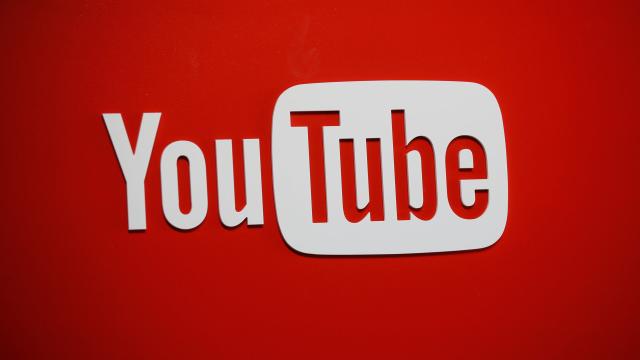YouTube has removed “hundreds” of videos advertising an essay-writing service, EduBirdie, following a BBC investigation that concluded over 250 channels were promoting the Ukraine-based company.
Photo: AP
According to the BBC, the investigation ultimately discovered more than 1,400 videos with over 700 million views promoting EduBirdie, with the topics covering “range of interests including: pranks, video games, fashion and dating.”
After the BBC revealed the results of the investigation, YouTube advised the channels in question that promoting cheating services was a violation of its policies against “academic aids,” which specifically prohibit both test-taking services and paper-writing companies. It further told them that videos featuring EduBirdie plugs would be removed if the creators didn’t do so themselves.
Numerous YouTubers complained that they had lost numerous videos as a result of the purge, with several saying dozens had disappeared. One channel claimed that 138 of their videos had been removed. According to the BBC, some said they were in the process of editing out the endorsements when the videos went down:
One channel, To Catch A Cheater, said 49 of its videos — a year’s worth of work — had disappeared.
AldosWorldTv said it had lost more than 30 videos, and questioned why he had been able to post so many videos containing the adverts.
TwinzTV, a US-based pranks channel posted on Twitter that “YouTube deleted 138 of our videos without any explanation”.
‘Get an A on your paper – and you don’t even need to do it’@YouTube stars are being paid to sell academic cheating. https://t.co/FhLCsR4mZX
— BBC Trending (@BBCtrending) May 1, 2018
YouTube deleted 138 of our videos without any explanation???? @DramaAlert pic.twitter.com/jOpU4APNdt
— Twinztv (@TwinzTV) May 5, 2018
So because Edubirdie on some dumb stuff, the Youtubers have to suffer the consequences?
That’s how @YouTube treats they creators lmao. No heads up or nothin. Ive seen people talking about their videos getting removed and I decide to check my emails too. pic.twitter.com/6PxFd2RJc3
— Dontai (@ImDontai) May 4, 2018
You were on bbc news for that edubirdie thing ???????? pic.twitter.com/YwtVZtesKv
— Samuel Stewartson (@sstewartson20) May 1, 2018
Essay-writing services are legal, the BBC noted, though people who are caught using them are usually subject to severe academic sanctions or expulsion. (It’s also potentially dangerous: Consider that cheating may be widespread at institutions like medical school.) There’s no reliable estimates of how common cheating is in general, though essay mills are reportedly on the upswing.
The BBC investigation revealed EduBirdie was paying a number of YouTube personalities directly, sometimes with language specifying the company could provide a “super smart nerd” to do the work and “free up time to play video games or take drugs.” The site also promised that the essays would be comprised of original content rather than than plagiarized off the internet. Some of the YouTubers being roped into the scheme were as young as 12 years old.
“I think it’s totally disgusting the fact that these type of organisations are exploiting vulnerable young people through getting them to promote something that isn’t good, isn’t ethical,” National Union of Students President Shakira Martin told the BBC.
EduBirdie issued a statement to the BBC more or less admitting that all of the above is true, but that really it’s all the YouTubers’ fault for their “creative choice” to “present the EduBirdie platform”:
In a statement it said: “We cannot be held responsible for what social influencers say on their channels.
“We give influencers total freedom on how they prefer to present the EduBirdie platform to their audience in a way they feel would be most relevant to their viewers.
“We do admit that many tend to copy and paste each others’ shout-outs with a focus on ‘get someone to do your homework for you’, but this is their creative choice.”
The only video left on EduBirdie’s channel explains how to write the introduction to an essay, though fittingly, it’s actually just something they liked on another creator’s channel.
YouTube has often had a contentious relationship with creators, who often allege that the site holds all the cards when it comes to disputes over rules or money, isn’t afraid to throw its clout around when confronted with complaints, and is generally opaque about what’s going on behind the scenes. For example, in 2016, disappearing subscribers led some of the site’s top personalities to accuse it of hiding a technical glitch or algorithm change.
More recently, the site unveiled new rules on what kind of content qualifies for monetisation and how much it will pay out that were touted as making YouTube safer for legitimate advertisers but some viewed as a pretext to slash payments.
Sometimes the site is accused of being an absentee landlord of sorts. With countless billions of hours of video stashed on its servers, it’s impossible to manually review all of that content. So by the time YouTube is suddenly compelled to pay attention to something — say, how its “YouTube Kids” section was flooded with content distinctly inappropriate for kids — the problem tends to have already spiralled out of control and there’s no way to handle it that doesn’t make somebody angry.
That’s generously assuming YouTube is actually even interested in solving the problem in the first place.
Of course, YouTubers could also have been a little more careful before endorsing academic fraud, just like they’re not supposed to advertise drugs, miracle cures, forged documents, fireworks, cigarettes, weapons, or some dumb scam called “e-gold,” just to name a few of the things on the list.
They could have also double-checked the section explaining that paid promotions have to comply with YouTube’s regular advertising rules, but perhaps the money was too good or too easy to pass up.
[BBC]
